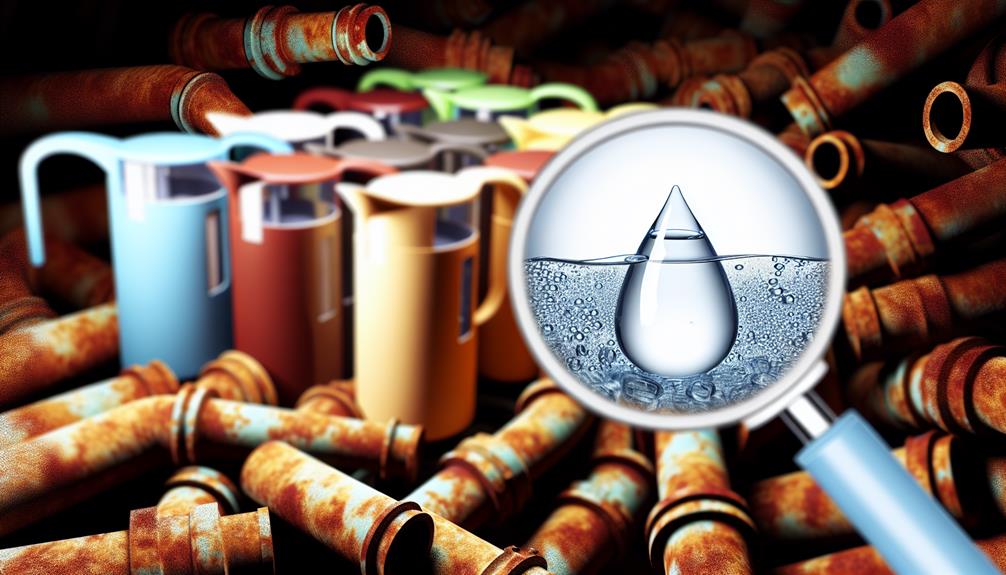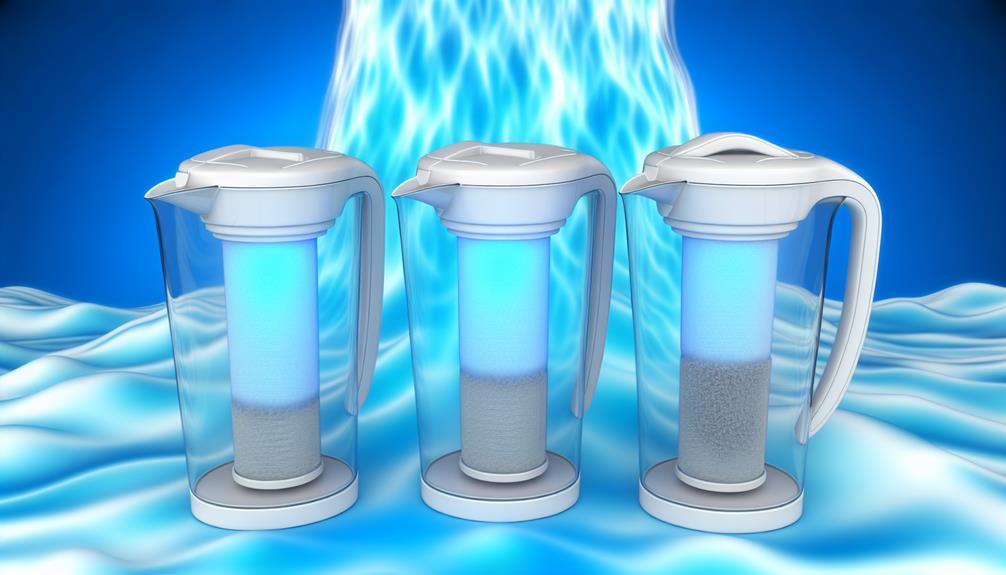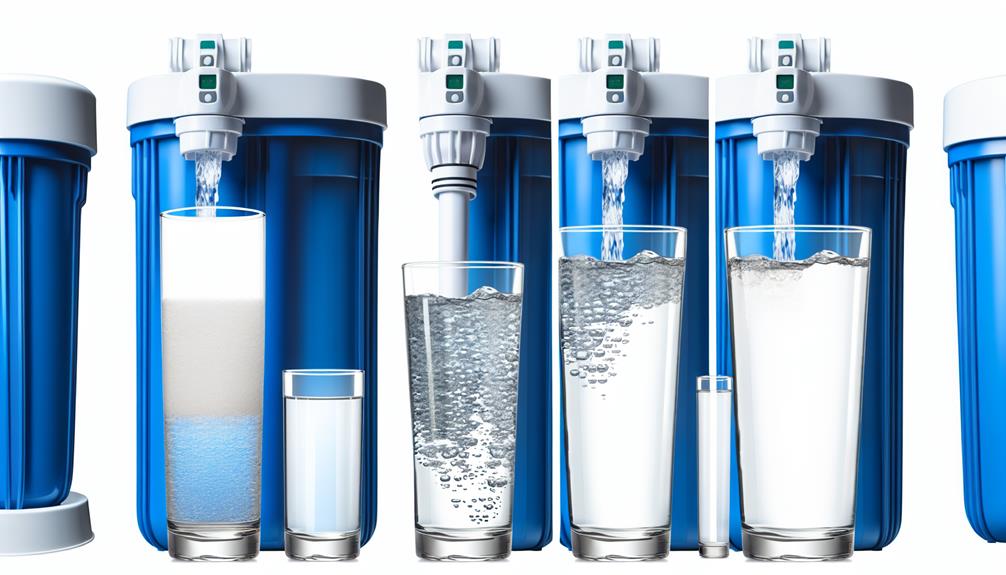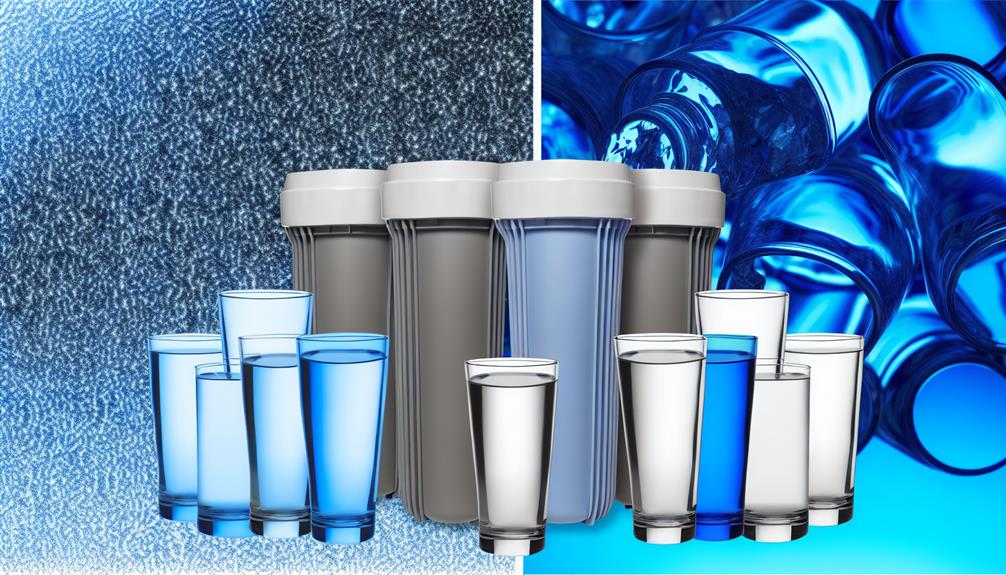When the crisis in Flint, Michigan made headlines, you likely became acutely aware of the dangers of lead in drinking water. Now, as you seek the peace of mind that your water is clean and safe, you're faced with a market flooded with pitchers claiming to filter out contaminants like lead. While many of these pitchers meet basic filtration needs, not all are equally effective when it comes to lead removal.
You might wonder which ones you can rely on without having to resort to a full-blown water purification system. In the next sections, we'll explore the types of pitcher filters that stand out from the rest, ensuring that the water you drink is not only refreshing but also free from harmful lead.
Let's investigate which pitchers offer the best defense against this invisible threat, so you can make an informed decision for your health and your home.
Understanding Lead Contamination

Lead contamination in drinking water, often stemming from aging infrastructure, poses a significant health risk that you must be vigilant about. Primarily, lead sources in your water supply can include corroded pipes, solder, and brass or chrome-plated faucets. This is especially true in older homes and public systems where lead pipes and fixtures were commonplace before awareness of the dangers became widespread.
When lead leaches into your drinking water, it's colorless and odorless, making it undetectable without proper testing. However, contamination symptoms can be a telltale sign that you're being exposed. Acute exposure can result in stomach pains, constipation, or nausea. Over time, the symptoms can escalate to severe issues like kidney damage, neurological disorders, and in children, developmental delays and learning difficulties.
You should approach this issue analytically; test your water regularly and stay informed about the condition of your local water infrastructure. If tests confirm the presence of lead, it's crucial to take immediate action. Using certified water pitchers designed to filter out lead can be an effective short-term solution, but ultimately, replacing the lead-contributing elements within your home's plumbing system is the most reliable method to ensure your water is safe to drink.
Types of Pitcher Filters
Having established the importance of mitigating lead exposure, let's examine the various types of pitcher filters available to purify your drinking water.
There are primarily two types: activated carbon filters and reverse osmosis filters. Activated carbon filters work by adsorbing contaminants onto the surface of the carbon particles. They're effective against various impurities, including chlorine, pesticides, and industrial solvents, but their ability to remove lead depends on the specific design and whether they incorporate a special media for lead adsorption.
Reverse osmosis filters, on the other hand, force water through a semi-permeable membrane, filtering out a broader spectrum of contaminants, including lead. While more thorough, they typically require more maintenance and have a slower filtration rate.
When considering filter lifespan, activated carbon filters generally need replacement every two to six months, whereas reverse osmosis filters can last up to a year or more, depending on usage.
Material safety is also crucial; ensure the pitcher is made from BPA-free plastics or other non-toxic materials to prevent additional contaminants from leaching into your water.
Always look for certifications from organizations like NSF International or the Water Quality Association to verify a filter's efficacy against lead.
Top Lead-Removing Pitchers

To ensure your drinking water is safe from lead contamination, it's crucial to choose a pitcher with a proven track record for effectively removing this toxic metal. Here are some of the top pitchers that have demonstrated high efficacy in eliminating lead from drinking water:
- ZeroWater Pitcher: This pitcher is equipped with a 5-stage filter that removes 99.6% of total dissolved solids, including lead. ZeroWater also offers a free testing kit to measure the presence of contaminants.
- PUR Ultimate Filtration Pitcher: Certified to remove 99% of lead, PUR pitchers use MAXION filter technology that blends carbon and ion exchange materials for thorough filtration.
- Brita Longlast+ Pitcher: Brita claims its Longlast+ filters are certified to reduce 99% of lead, thanks to their proprietary pleated filter design and activated carbon components.
- Clearly Filtered Pitcher: Independently tested to meet NSF standards, this pitcher boasts an affinity for capturing lead and over 230 other contaminants.
When selecting a lead-removing pitcher, consider the lead sources in your area and the testing methods each brand employs. Reliable brands often provide detailed performance data and certifications to substantiate their filtration claims, ensuring you can trust the quality of the water you drink.
Pitcher Filter Maintenance Tips
Once you've selected a top-quality pitcher for lead removal, it's essential to maintain its filter properly to ensure ongoing effectiveness in purifying your water. Understanding the filter lifespan is crucial; most pitcher filters have a finite number of gallons they can effectively treat. Typically, a filter can last for about two to three months, or after filtering approximately 40 gallons of water, but this can vary based on the model and usage.
Pay close attention to replacement indicators, which are often built into the pitcher. These indicators might be in the form of a light, a timer, or a manual dial that keeps track of filter usage. They serve as a critical prompt to let you know when it's time to replace the filter.
To preserve filter efficacy, follow the manufacturer's instructions meticulously. This usually involves soaking new filters before use and flushing them with water to remove any carbon particles. Avoid overfilling the pitcher, as this can cause unfiltered water to mix with the clean water, diminishing the overall quality.
Health Benefits of Lead-Free Water

Drinking lead-free water significantly reduces the risk of cognitive impairment and cardiovascular problems, offering a clear pathway to improved overall health. Lead toxicity poses severe health risks, and water purification methods that eliminate lead are vital for maintaining a body free from its harmful effects.
Here's how you benefit from consuming water without lead:
- Reduced Developmental Issues: Children exposed to lead-free water have a lower risk of developmental delays and learning difficulties.
- Decreased Blood Pressure: Adults drinking water without lead can experience lower blood pressure levels, reducing the risk of hypertension.
- Enhanced Kidney Function: By avoiding lead-contaminated water, you protect your kidneys from potential damage that can lead to chronic kidney disease.
- Lowered Risk of Reproductive Problems: Lead exposure has been linked to reproductive issues; consuming lead-free water helps safeguard reproductive health.
Utilizing pitchers that remove lead is a proactive step toward water purification and the prevention of lead-related health complications.
Ensuring your water is free from lead isn't just about quenching thirst—it's a critical component of your long-term wellness strategy. Stay informed, stay healthy, and keep lead out of your water—and your body.
Conclusion
In conclusion, you've learned that not all pitcher filters are equal in combating lead contamination. To ensure your water is lead-free, invest in top-rated pitchers with certified filtration capabilities.
Remember, maintaining your pitcher filter is crucial for optimal performance. By doing so, you'll reap the significant health benefits of clean water.
Stay informed, choose wisely, and maintain diligently for the safest drinking experience.

